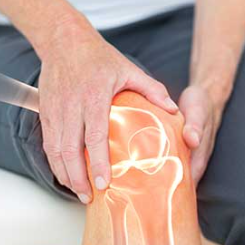Frequent knee pain affects about 25% of adults. It’s a common problem that can significantly reduce your mobility and overall quality of life. The pain management specialists at Restore Health in Spokane and Richland, Washington, will evaluate you for beneficial interventional pain management and regenerative medicine solutions to alleviate knee discomfort and optimize healing.

Knee Pain FAQ’s
Knee pain is discomfort in your knee joint. It can feel debilitating, diminishing your mobility in many cases. Fortunately, the highly-trained team at Restore Health offers holistic, non-surgical, and fluoroscopy-guided procedures for knee pain relief.
Signs and symptoms you have a knee injury or chronic disease associated with knee pain include:
- Swelling
- Stiffness
- Crunching or popping sounds
- Redness
- Bruising
- Joint discomfort
- Inability to straighten your leg
- Diminished mobility
Knee pain can range from mild to intense in severity. It might feel like a sharp pain or dull, aching pain. Seek medical treatment right away to prevent a minor knee injury from becoming severe.
Common causes of knee pain include:
- Arthritis
- Age-related wear and tear
- Fractures
- ACL injuries
- Tendonitis
- Bursitis
- A torn meniscus
- A dislocated kneecap
You might experience a knee injury from playing sports, falling down, or being in a car accident. Risk factors for knee pain include obesity, older age, previous injuries, and lack of flexibility or strength.
To find the root cause of knee pain and develop a treatment plan, your Restore Health specialist reviews your symptoms and medical history and examines your knee. They look for swelling, bruising, or other signs of an injury. X-rays, CT scans, MRIs, and ultrasounds are diagnostic imaging procedures that help your doctor make a final diagnosis.
Based on the type and severity of knee problems you experience, your Restore Health pain management specialist might recommend:
Home remedies
For a minor knee injury or pain, your doctor may suggest rest, ice, compression, and elevation, or wearing a knee brace when you’re physically active.
Physical therapy
Physical therapy sessions with a specialist can stretch and strengthen tissues around your knee joint to stabilize it and reduce pain.
Platelet-rich plasma (PRP)
PRP uses growth factors from your blood to stimulate your body’s natural healing response and regenerate tissue. It’s a holistic treatment for knee pain and other joint injuries. Your provider takes a blood sample from your arm, spins it in a centrifuge, and injects it into painful areas.
Injections
In addition to or instead of PRP injections, your pain management provider might recommend steroid injections, fluoroscopic-guided HYALGAN® viscosupplementation, or anesthetic injections to reduce swelling or better lubricate your joints.
Radiofrequency ablation
Radiofrequency ablation uses targeted energy to heat nerves and block pain signals to your brain.
Surgical procedures
If you experience a severe knee injury or pain, your provider might suggest you undergo a surgical procedure, such as arthroscopic knee surgery or a knee replacement.
Don’t live with knee pain that interferes with staying active and your quality of life. Schedule a knee pain appointment with Restore Health by calling the office nearest you or booking online today.
